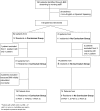From the patient's perspective: the impact of training on resident physician's obesity counseling
- PMID: 20217268
- PMCID: PMC2855014
- DOI: 10.1007/s11606-010-1299-8
From the patient's perspective: the impact of training on resident physician's obesity counseling
Abstract
Background: It is uncertain whether training improves physicians' obesity counseling.
Objective: To assess the impact of an obesity counseling curriculum for residents.
Design: A non-randomized, wait-list/control design.
Participants: Twenty-three primary care internal medicine residents; 12 were assigned to the curriculum group, and 11 were assigned to the no-curriculum group. Over a 7-month period (1-8 months post-intervention) 163 of the residents' obese patients were interviewed after their medical visits.
Intervention: A 5-hour, multi-modal obesity counseling curriculum based on the 5As (Assess, Advise, Agree, Assist, Arrange) using didactics, role-playing, and standardized patients.
Main measures: Patient-report of physicians' use of the 5As was assessed using a structured interview survey. Main outcomes were whether obese patients were counseled about diet, exercise, or weight loss (rate of counseling) and the quality of counseling provided (percentage of 5As skills performed during the visit). Univariate statistics (t-tests) were used to compare the rate and quality of counseling in the two resident groups. Logistic and linear regression was used to isolate the impact of the curriculum after controlling for patient, physician, and visit characteristics.
Key results: A large percentage of patients seen by both groups of residents received counseling about their weight, diet, and/or exercise (over 70%), but the quality of counseling was low in both the curriculum and no curriculum groups (mean 36.6% vs. 31.2% of 19 possible 5As counseling strategies, p = 0.21). This difference was not significant. However, after controlling for patient, physician and visit characteristics, residents in the curriculum group appeared to provide significantly higher quality counseling than those in the control group (std beta = 0.18; R(2) change = 2.9%, P < 0.05).
Conclusions: Residents who received an obesity counseling curriculum were not more likely to counsel obese patients than residents who did not. Training, however, is associated with higher quality of counseling when patient, physician, and visit characteristics are taken into account.
Similar articles
-
Assessing and counseling the obese patient: Improving resident obesity counseling competence.Obes Res Clin Pract. 2018 Mar-Apr;12(2):242-245. doi: 10.1016/j.orcp.2018.02.007. Epub 2018 Mar 16. Obes Res Clin Pract. 2018. PMID: 29555317
-
The impact of primary care resident physician training on patient weight loss at 12 months.Obesity (Silver Spring). 2013 Jan;21(1):45-50. doi: 10.1002/oby.20237. Obesity (Silver Spring). 2013. PMID: 23505167 Clinical Trial.
-
Physicians' use of the 5As in counseling obese patients: is the quality of counseling associated with patients' motivation and intention to lose weight?BMC Health Serv Res. 2010 Jun 9;10:159. doi: 10.1186/1472-6963-10-159. BMC Health Serv Res. 2010. PMID: 20534160 Free PMC article.
-
"I Don't Trust It": Use of a Routine OSCE to Identify Core Communication Skills Required for Counseling a Vaccine-Hesitant Patient.J Gen Intern Med. 2022 Jul;37(9):2330-2334. doi: 10.1007/s11606-022-07495-4. Epub 2022 Jun 16. J Gen Intern Med. 2022. PMID: 35710665 Free PMC article. Review.
-
Managing obesity in primary care practice: a narrative review.Ann N Y Acad Sci. 2013 Apr;1281(1):191-206. doi: 10.1111/nyas.12004. Epub 2013 Jan 16. Ann N Y Acad Sci. 2013. PMID: 23323827 Free PMC article. Review.
Cited by
-
Development of a telehealth obesity OSCE and reliable checklist for assessment of resident physicians: a pilot study.BMC Med Educ. 2022 Aug 19;22(1):630. doi: 10.1186/s12909-022-03672-5. BMC Med Educ. 2022. PMID: 35986272 Free PMC article.
-
An instrument to measure adherence to weight loss programs: the compliance praxis survey-diet (COMPASS-Diet).Nutrients. 2013 Sep 26;5(10):3828-38. doi: 10.3390/nu5103828. Nutrients. 2013. PMID: 24077238 Free PMC article.
-
Impact of bariatric and metabolic surgery education program on the knowledge and attitude of medical students.Turk J Surg. 2023 Mar 3;39(1):63-69. doi: 10.47717/turkjsurg.2023.5639. eCollection 2023 Mar. Turk J Surg. 2023. PMID: 37275934 Free PMC article.
-
What works and why in the identification and referral of adults with comorbid obesity in primary care: A realist review.Obes Rev. 2020 Apr;21(4):e12979. doi: 10.1111/obr.12979. Epub 2019 Dec 22. Obes Rev. 2020. PMID: 31867842 Free PMC article. Review.
-
Feasibility and Acceptability of a Mobile-Assisted Screening and Brief Intervention for Multiple Health Behaviors in Medical Settings.J Prim Care Community Health. 2024 Jan-Dec;15:21501319241303604. doi: 10.1177/21501319241303604. J Prim Care Community Health. 2024. PMID: 39707878 Free PMC article.
References
Publication types
MeSH terms
Grants and funding
LinkOut - more resources
Full Text Sources
Medical
Research Materials


